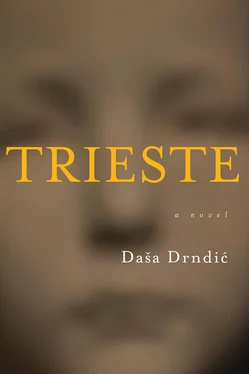At the border between Albania and Yugoslavia columns of Italian Wehrmacht prisoners of war peer frantically about and beg for a crust of bread, while digging in sub-zero temperatures, seeking their way under mounds of snow, looking for a path, an exit. In thin voices that crack with the cold, they call to their loved ones and send them messages. Here, at the border whose encirclement ruptures, making it a passage, an exit, the Tedeschi family, with hundreds of civilians and soldiers on their way to Budapest, clamber into a railway car, never dreaming, not even wanting to know, what is happening just a little further north, what journeys there are, and to what end. Traversing Montenegro, Hungary and Austria, Florian and Ada and their four children arrive in Italy just before Christmas 1943.
The train stands in Budapest for several hours. Off it leap neatly pressed German soldiers, well fed and freshly shaven. The Hungarians toss portions of goulash, bread, milk and little bottles of rum in through the windows to the other passengers. Not three months later, from this same platform at Keleti station and several other smaller train stations in and around Budapest, other train carriages, locked freight cars, cattle wagons, with a hundred people in each, with a bucket for piss and a bucket for drinking water, will depart for a walled-in station, a blind track leading to a cosmic twilight. From early spring to early summer 1944 the crematorium at Auschwitz will work at full capacity, and daily it will vomit up the remains of 6,000 people, murdered, who will float away like gray eiderdown into the sky. And so it is that in two and a half months 400,000 Hungarian Jews will leap on board the “messianic timetable placed on the Index by the new order”, in a “wretched reworking of the antediluvian evacuation, this landlocked, earthbound reprise of Noah’s ark”, which was written for them by an unknown man in long black tails, in a shirt with a “stiff celluloid collar, yellowed like an old domino, the headwaiter’s tie with a bohemian knot, swinging his cane high in the air, swaying on his feet like a ship’s mast, staring into space”, a gentleman by the name of Eduard Sam, a gentleman who, with a glance at his watch “with a dial and Roman numerals showing the exact time ”, steps out of the “frame of the drama and farce of which he is writer”.
The way lives interweave yet never touch, only to collide in mutual destruction, inconceivably distant in their simultaneity. In 1944 the former senior inspector of the state railways, by then a “retired senior railway inspector”, author of a timetable, Eduard Sam, steps along in a “column of the miserable and the ill, among horrified women and terrified children, going with them and alongside them, tall and bent over, without his spectacles, without his cane, which they had taken from him, staggering along with uncertain steps in the queue of the sacrificed, as a shepherd among his herd, a rabbi with his flock, a school teacher at the head of a group of school children…” So Eduard Sam moves towards the trains, towards the train carriages, whose departures and arrivals he has so often calibrated, checked, supplemented, coordinated, perfected , and now, as he walks, the times of train departures and arrivals, of routine departures and arrivals, run in his head like a refrain, like a ditty, much like the clacking of wheels, in close harmony with his broken step, like a song that will determine his fate, and to himself he repeats those arrivals and departures of trains, those routine departures . And, while Eduard Sam strides to his finality, high-level Nazi officials in Berlin, Cracow, Warsaw, everywhere, the perfect bureaucrats Dr Albert Ganzenmüller, State Secretary of the Reich Transport Ministry, and his superior, S.S. General Karl Wolff, Himmler’s personal adjutant, obediently apply the special, newly composed timetable to the new order. S.S. official Dr Albert Ganzenmüller, without a trace of malice, earnestly, with devotion and meticulous attention, crosses out, annuls Eduard Sam’s timetable of trains , of special trains , which had been honed for years, and in the serenity of an airy office composes his own Fahrplanordnung 587, Fahrplanordnung 290, and so on, special timetables of trains , of special trains, on which he stamps the official seal of annihilation.
Mr Ganzenmüller, you like trains?
Yes, Your Honour, trains are my passion, my obsession .
From 1928 you’ve worked for the German Railways, and as early as 1931, as a member of the Nazi party, you were involved in anti-Jewish activities .
I wouldn’t put it that way. Things were much more complex .
You scheduled civilian trains for deporting Jews to the camps. From 1942 to 1945 you supervised the German State Railway .
I was following orders from above .
You secured the unobstructed running of trains to the death camps. Thanks to you Operation Reinhard ran smoothly .
Operation Reinhard? I only heard of Operation Reinhard after capitulation .
You personally drew up many and varied timetables. Such as a timetable for transporting elderly German Jews to Theresienstadt .
That was my duty, to see to the unobstructed movement of trains. Besides, composing timetables was a hobby of mine. Like solving challenging crossword puzzles .
In 1942 a vast “purge” of the ghettoes begins throughout the General Government .
About that I know nothing .
In June and July there are construction works on the railway line leading to Sobibor — a mass extermination camp. There is an unplanned halt in the transports, and on 16 July S.S. General Karl Wolff seeks your help .
I don’t remember .
Instead of sending 300,000 Warsaw Jews to Sobibor you redirect them to Treblinka. After 22 July a train runs daily with 5,000 Jews from Warsaw to Treblinka, while another train runs twice weekly from Przemysl to Belzec. Further, on 28 July, 1942, you, Albert Ganzenmüller, Secretary of the Ministry of Transport — Reichsverkehrsministerium, and Deputy General Director of the German Reichsbahn, report to S.S.-Gruppenführer Wolff on the measures you have taken .
Have you proof?
We have your correspondence with Wolff. On 13 August, 1942, Wolff writes:
Warm thanks, both in my own and the S. S. Reichsführers name, for your letter of 28 July, 1942. I was especially delighted to hear from you that already for a fortnight there has been a daily train, taking 5,000 of the Chosen People to Treblinka, thus enabling us to carry out this movement of population at an accelerated pace. I have personally contacted all the agencies involved in the process so that the job can proceed without impediment. I thank you again for your efforts regarding this question and also request that you continue to bring your personal attention to every detail, for which I will be particularly grateful. Sincerely yours and Heil Hitler! W.
I do not recall this correspondence .
So you claim you received Wolff’s letter, stamped as Top Secret, a letter from the second highest official in the Third Reich, and you did not read it? Three million Jews were taken to their deaths in that operation .
I know nothing of Treblinka. I did not realize that Treblinka was a mass extermination camp. I thought it was a Jewish reservation, so Himmler explained it to me. I knew nothing of the fate of the Jews. I saw nothing. I worked in my office. I was not out strolling around .
This is drivel, Ganzenmüller. In May 1942, before the camp was set up, we knew something was going on at Treblinka, and the information was given to us by German railway workers. Some S. S. officials arrived at Treblinka in May 1942 and arrested a hundred men, Jews from both Treblinka and its neighbourhood, and ordered them to clear the land. The Ukrainian guards arrived right after the prisoners. The S. S. claimed that the inmates would work on damming the River Bug to build a new military installation, but the German railway workers stubbornly insisted it was going to be an extermination camp for the Jews .
Читать дальше












